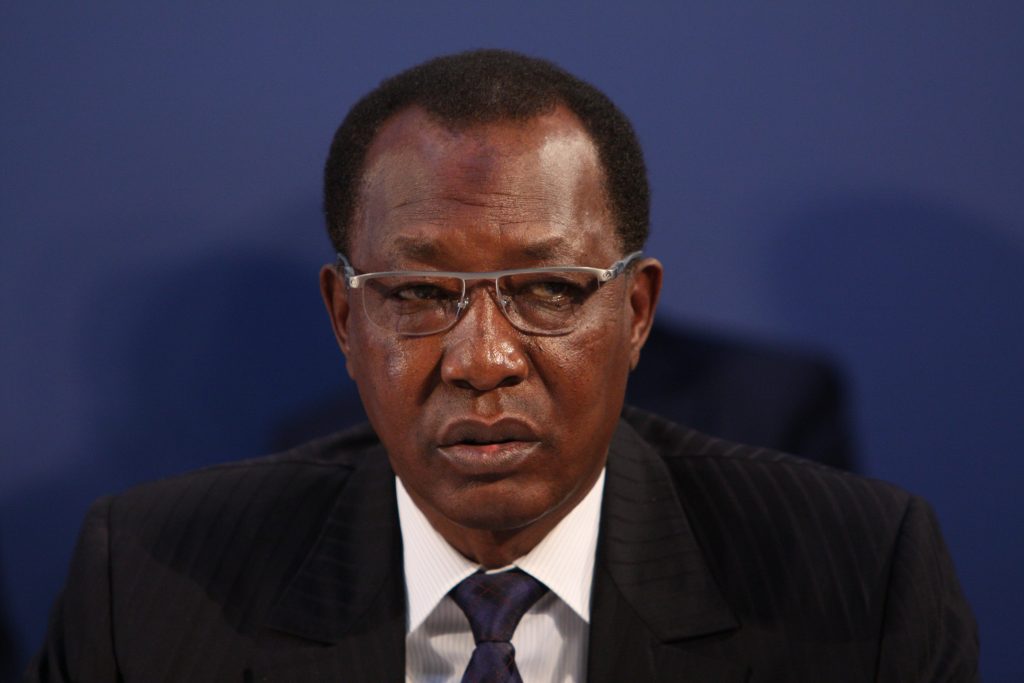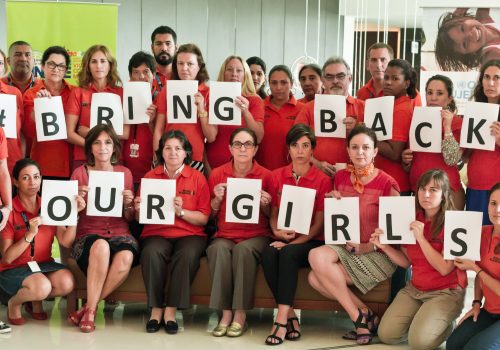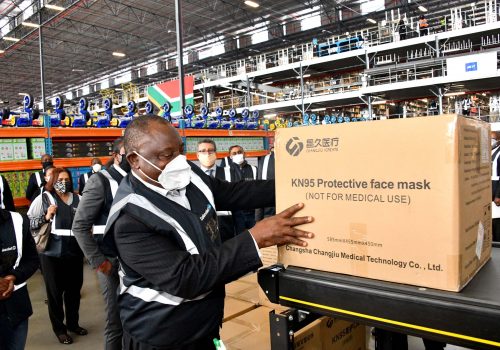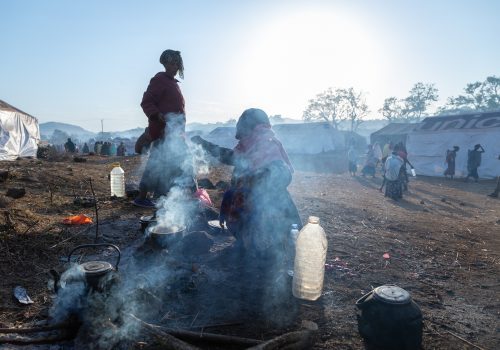In the last week, several columns of rebel fighters have entered Chad from neighboring Libya with the intention of unseating long-time strongman and friend of the West Idriss Déby Itno, Chad’s ruler for the past thirty years. Despite multiple claims by Chad’s government spokesman that the rebel formation had been defeated, this weekend US, French, and UK embassies ordered withdrawals from their embassies or advised their nationals to leave immediately or shelter in place citing a likelihood of violence in the capital, N’Djamena. The attack comes two years after French Mirage fighter jets intervened on Déby’s behalf to destroy a similar offensive by the FACT rebel group and only a week after Déby contested his sixth presidential election in which he is expected to win handily in a vote widely seen as fraudulent.
What is Chad’s strategic significance?
Chad sits strategically astride the Sahel and the Horn of Africa and has largely been viewed by Western powers as a critical state in staunching the spread of radical Islam and terrorism from the western Sahel region and as a buffer to the long-term instability coming from Sudan’s Darfur region on Chad’s eastern border. Chad shares its northern border with Libya and has been seen as an important part of regional strategies to stem the tide of instability emanating from its collapse since the overthrow of long-time dictator Muammar Gaddafi.
Who is Chad’s current leader?
Chad’s leader, Marshal Idriss Déby Itno, has ruled Chad for thirty years, having overthrown his mentor and predecessor, Hissène Habré, who is himself now serving a life sentence on charges of genocide, crimes against humanity, and torture, conducted while Déby served as his army chief. Just last week, Chad held presidential elections where Déby declared, “I know in advance that I will win.” Preliminary results that are just now beginning to emerge suggest that he is right. Most outside observers agree that Déby’s re-election to a sixth six-year term is a foregone conclusion given that he disqualified fully half of the candidates who sought to unseat him; attacked, jailed, and intimidated his closest contenders; and banned campaign and protest rallies for the remaining candidates in the weeks leading up to the April 11 vote. After he changed the constitution in 2018, allowing himself an additional two terms as president, Déby could now serve until 2033, a total of forty-three years.
Déby’s efforts to undermine the opposition and hollow out civil society are both a function and a driver of his growing unpopularity in the country. Déby’s inability to turn billions of dollars in oil revenue accumulated since Chad started exporting its production through a World Bank-financed oil pipeline has emerged as a particular sore point for any Chadian not a part of Déby’s Zaghawa tribe, who have benefited the most from the corrupt patronage system that oil wealth has created. When the World Bank pulled out of the pipeline deal in 2008, its final report noted “Chad failed to comply with the key requirements of this agreement. . . The government did not allocate adequate resources critical for poverty reduction.”
What is Déby’s relationship with Western powers today?
Déby has strong ties to Washington and Paris, who for decades have largely overlooked his abysmal record of human, civil, and political rights at home because of his strength and reliability in leading military operations against common foes across the region. Déby earned his reputation as a tough-as-nails military tactician during the decade of Chad’s wars with Libya in the 1980s, leading one of the few African armies to successfully beat back Libyan influence and incursions.
Trained in France as a pilot and in military tactics, Déby in recent years earned admiration and respect for his role in France’s Operation Barkhane and the broader G5 Sahel initiative, a US, European, and African security mission deployed primarily across Mali, Niger, and Burkina Faso to roll back the terrorist threat there. Déby has been equally active in neighboring Nigeria in combatting Boko Haram elements and even famously complained to the New York Times about “a definite deficit of coordination, and a lack of common action” from the Nigerian army in the fight. Déby’s main political opponent, Saleh Kebzabo, who boycotted last week’s presidential election, has described Déby’s relations with the West the most succinctly, “They’ve found someone to do their dirty work. Then, they close their eyes.”
Beyond “dirty work,” Déby has also sought to disarm his Western critics through other relations of convenience. He has ingratiated himself with a generation of French military officers who have at some point in their careers cycled through the French airbase now constituting the largest French presence on the continent and representing the most visible remaining vestige of the Françafrique relations that emerged after African independence that ensured that France’s former colonies remained in a cozy French orbit through a not-so-secretive web of interlocking political, economic, and military ties binding French and African elites. Most significantly, France intervened militarily to ensure Déby’s hold on power when in February 2019 French Mirage fighter jets were dispatched from France’s airbase on the outskirts of N’Djamena to destroy a column of advancing rebels, doubling down on France’s commitment to the autocrat.
Washington, too, along with other European powers, have benefitted from Déby’s strategic decisions. Serving as host to more than a million Darfuri refugees in Chad’s far eastern region for more than a decade, Déby financed much of the relief operation there and allowed Western humanitarian organizations, human rights observers, and journalists ready access to his country to investigate atrocity crimes within Darfuri refugee camps there and as a staging ground into Darfur during the years of Sudan’s genocide against African Darfuris. Similarly, he dispatched his troops to Libya in support of Western efforts to install Khalifa Haftar and his Libyan National Army when that was still the policy, and has been the beneficiary of European Union (EU) and member state funding to crack down on the human trafficking and illegal migration routes stopping migrants before they arrive in Libya to embark for European shores.
What is the current situation on the ground?
It is hard to assess the current threat to Déby given conflicting reports that are emerging from the region and the remoteness of the landscape the rebels are currently crossing. What we do know is that as many as one hundred vehicles and perhaps five hundred or more anti-Déby rebels from Chad’s Front for Alternation and Concord in Chad (FACT) crossed back into Chad on Sunday, April 11. Despite a government announcement that the “terrorists have been routed,” subsequent rebel statements have claimed the downing of two Chadian MiG-21s and an army helicopter, the seizing of several army armories and by Saturday, April 17 a claim of control over the entire region of Kanem, which at its southern point is only 150 kilometers from N’Djamena and nearly 1,000 kilometers south of the Libyan border from where they entered Chad.
FACT rebels in their statements have sought to put anxious observers at ease. They have invited Chadian soldiers to “serve the nation” by joining their rebellion, all the while attempting to reassure Chadian “citizens and Chad’s external partners” that the rebellion intends to ensure their safety and security and that of the country’s borders, while also continuing to support Chad’s external security commitments, presumably meaning under Operation Barkhane. Thus far, FACT appears to be avoiding any urban areas and there have been few reports of civilian casualties. In fact, Déby’s deep unpopularity, as demonstrated by the country’s bleak economic outlook (still ranking 187 out of 189 countries on the UN Human Development Index despite earning billions in oil revenues) and recent lower voter turnout rates, suggest that the FACT could well be successful in tapping into pent up frustration from within the military and civilian ranks.
What are the implications for the region if Déby were to fall?
Déby’s fall at this time would send shockwaves from the Red Sea to the Atlantic. Its most immediate impact would be on the multinational G5 Sahel initiative, to which the United States and France are the most substantial contributors. However, as violence has only continued to rise after ten years of combat operations and both countries’ publics continue to question the goals and values of having their forces deployed in remote regions whose direct security threat to national interests seems equally remote, the possible loss of the leading African element could cause Paris and Washington to fundamentally rethink their involvement. Many have begun to argue that the military component of the Sahelian response operation has been a failure for the West anyway and what is really needed is development assistance, institution strengthening, service delivery, and civil society engagement—ironically, all of which Chad itself requires.
Less well known but as significant has been Déby’s increasing involvement in recent instability in the neighboring Darfur region of Sudan. Sudanese media attribute the recent uptick in violence in the West Darfur capital of Geneina between Arab and African tribes to Déby’s arming of Masalit and Zaghawa tribesmen in the absence of United Nations peacekeepers. His departure from the scene would remove a perennial source of instability inside Darfur, but at the same time would deny the leader of Sudan’s Rapid Support Forces, General Mohamed Hamdan “Hemedti” Dagalo, a key Zaghawa ally to whom Hemedti had reportedly entered into a mutual security pact last January. Without external backing, Hemedti, who has been seen as a potential Déby-like strongman in Sudan, might well temper some of his notorious ambitions, giving the fragile transition in Khartoum more time to take hold.
What to watch for?
All eyes should be on France and whether President Macron will once again fly into the defense of his friend Idriss Déby, despite Macron’s own efforts early in his time in office to distance himself from the long history of nefarious and unseemly ties between his government and multiple generations of African strongmen. In 2019, France’s national newspaper Le Monde warned that airstrikes in support of Déby made Paris “appear as the protector of a predatory and corrupt regime.” And in light of last week’s deeply flawed elections and the abhorrent treatment of the political opposition in the lead-up to the vote, such an open and self-serving embrace from Paris now could well damage Macron’s credibility even further in the lead-up to elections next year if he appears to double down on a failed military approach in the Sahel on top of a distasteful support of a notorious autocrat.
This time, however, France’s European allies who are similarly committed to the extremist fight in the Sahel as part of the G5 initiative might themselves have something to say about Paris’ continued backstopping of such an odious regime, despite its usefulness to their security mission. According to Western diplomats in the region, rumors abound that German and other Nordic contributors have warned Paris that they could well pull their support from the entire mission if France were to intervene in what they see as an internal Chadian concern.
But Paris is no doubt hoping it need not come to that. Reading the current thinking and its own public opinion, Paris is likely attempting to assist their man in N’Djamena all the while attempting to stay off the field of battle in Chad. We can be sure that France’s military and intelligence services are sharing all matter of battlefield intelligence and providing Déby the operational and logistical support necessary to stop this incursion, but are at present clearly leaving the fighting to Déby. French reports indicate that Déby is stationing tanks and other heavy armaments around the city now in anticipation of mounting a final stand from the presidential palace. This explains the evacuations of many Westerners from N’Djamena this weekend, but it does not answer the question of how Paris will respond to the dilemma it faces in Chad: ensure your preferred strongman continues his unpopular grip over your former colony or stand by while your thirty-year investment in Idriss Déby is washed away and a new approach to security in the Sahel is foisted upon you. The implications for French and US security policy are likely to be felt for years to come.
Cameron Hudson is a senior fellow at the Atlantic Council’s Africa Center. Previously he served as the chief of staff to the special envoy for Sudan and as director for African Affairs on the National Security Council in the George W. Bush administration. Follow him on Twitter @_hudsonc.
Further reading
Image: President Idriss Déby of Chad at the London Conference on The Illegal Wildlife Trade, 13 February 2014. (Flickr/Foreign, Commonwealth & Development Office)



